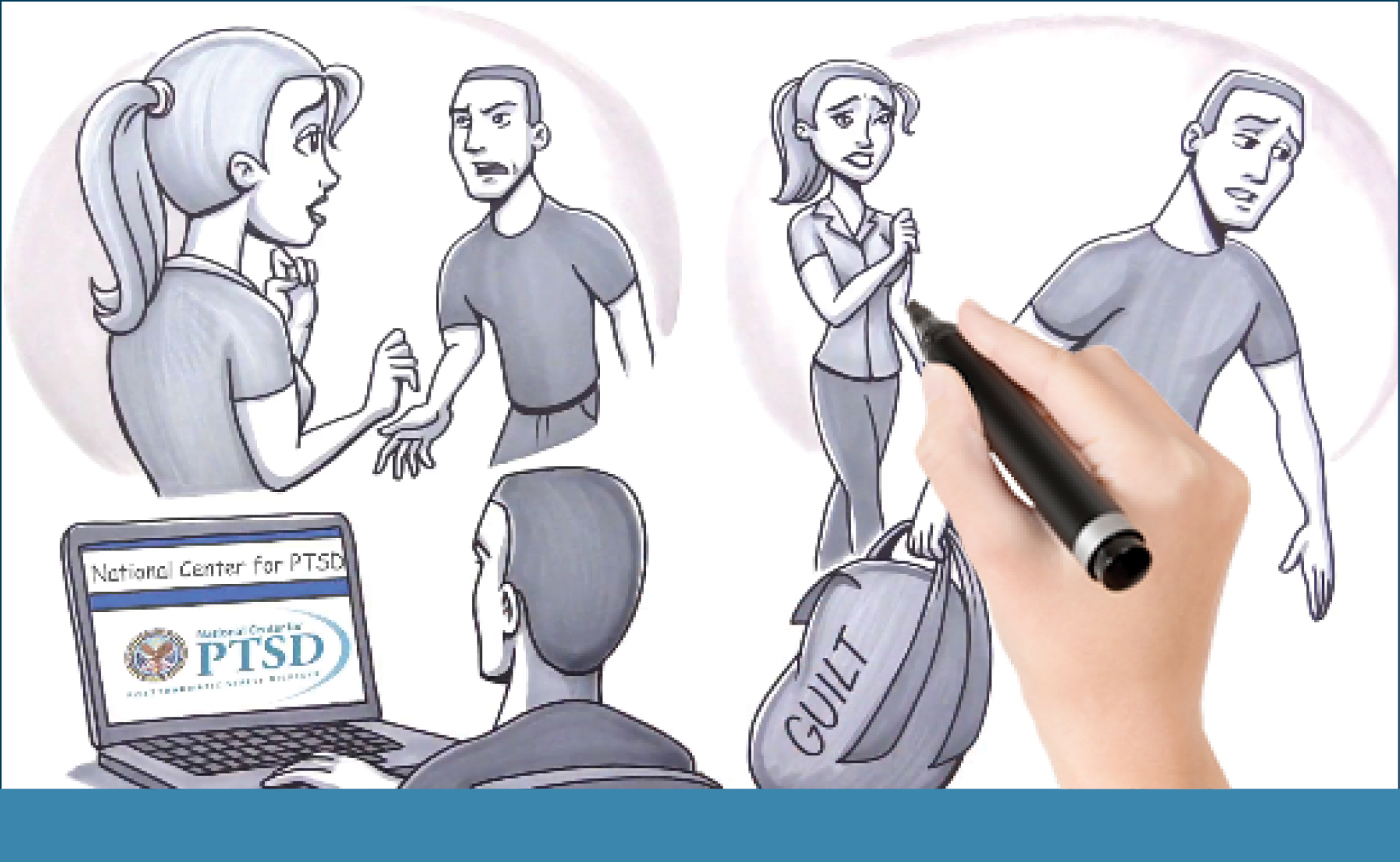PTSD: National Center for PTSD
Intimate Partner Violence
Intimate Partner Violence
Intimate partner violence (IPV) refers to violence and aggression between people in a close relationship. It can happen to men or women. There are risks, or red flags, you can look for in your partner's behavior. Learn about IPV and its effects as well as ways you can stay safe and get help.
Reading time: minutes
IPV refers specifically to violence and aggression between intimate partners. IPV can include physical, sexual or psychological abuse or stalking. Acts of IPV range in how often they occur or how violent they are. It can happen to women or men who have intimate relationships with women, men or both. It can happen no matter your age, income, race, ethnicity, culture, religion, or disability.
IPV includes, but is not limited to, any of the following:
- Physical violence: hitting, pushing, grabbing, biting, choking/strangulating, shaking, slapping, kicking, hair-pulling, restraining
- Sexual violence: attempted or actual sexual contact when the partner does not want to or is unable to consent (for example, when affected by alcohol or illness)
- Threats of physical or sexual abuse: ways to cause fear through words, looks, actions or weapons
- Psychological or emotional abuse: name calling, humiliating, putting you down, keeping you from friends and family, bullying, controlling where you go or what you wear
- Stalking: following, harassing, or unwanted contact that makes you feel afraid
Some people experience only one of these forms of violence while others experience many types of violence. IPV can be a single event or last for many years. No matter what, no one deserves to be treated this way.
What Are Some Relationship Red Flags?
Relationships can be complicated in general. A relationship with IPV can be overwhelming and confusing. Sometimes it can be hard to know if you have experienced IPV. The following questions give some examples of unsafe behaviors that can happen in a relationship.
- Does your partner control all of the family income and budget? Control your work or your schooling?
- Does your partner keep you away from friends and family? Control you by questions and threats about what you do, where you go, and people you see?
- Does your partner put you down, or make you feel guilty or ashamed? Blame you for the abuse?
- Does your partner make or carry out threats to hurt your body or your feelings, or those of someone you love? Threaten to ruin your reputation? Threaten to take your children away?
- Does your partner scare you by breaking or destroying objects, or punching holes in walls? Hurting or threatening pets?
- Does your partner physically hurt you or try to hurt you?
- Does your partner force you to engage in sexual activities?
- Does your partner threaten to commit suicide or kill you if you leave the relationship?
If you answered yes to any of these questions, your health and safety may be at risk. Help is available. Take a look at the resources listed below and know that you can get help if and when you are ready.
How Do I Know When I Am in a Healthy Relationship?
Some people who are in relationships with IPV may not have had much experience in safe, healthy relationships. They may not believe that healthy safe relationships actually exist. While no relationship is perfect, here are some behaviors that are commonly found in healthy relationships:
- Your partner supports your relationships with friends and family members.
- Your partner asks your opinion and respectfully listens to your answers. You and your partner can agree to disagree and resolve conflicts without fear of name calling, insults, manipulation, threats, or violence.
- Your partner accepts responsibility for his or her own mistakes, behavior, thoughts, or feelings and will offer sincere apologies and work to change accordingly.
- Your partner trusts you, is trustworthy and is someone you and your children feel safe with.
- You share in the decision making, the responsibility of family budgeting, and sharing the family resources to benefit all family members.
If you find that you would like to build or increase these behaviors in your current and future relationships, you may consider consulting with a health care professional about how to find support in doing so.
How Common Is IPV?
You are not alone. IPV can happen to anyone no matter how much education or money they have. In the United States, about 1 in 4 women (or 27%) and 1 in 10 men (or 11%) report having been harmed by sexual or physical violence, or by stalking by an intimate partner at some point in their lives.
How Might IPV Affect Me?
You may not realize it, but the impact of IPV can reach far beyond the actual or threatened violence or aggression. Much of the research looks at female victims of IPV, but the findings are generally true for men as well. Here are some examples:
Physical health:
- Experiencing IPV may mean that you have more physical health problems. For example, women who experienced IPV are twice as likely to have a chronic illness and five times as likely to have coronary heart disease. Women who have experienced IPV are also twice as likely to have chronic neck or back pain or stomach problems such as irritable bowel syndrome.
- IPV may also increase your exposure to sexually transmitted diseases, such as chlamydia and human immunodeficiency virus (HIV).
- Women who have experienced IPV may also have more female health problems.
Psychological health:
- Experiencing IPV may mean that you have more problems with your mood. IPV can lead to depressed mood, feelings of worthlessness, anxiety or worry, feeling emotionally numb (such as difficulty feeling your emotions or connecting with others emotionally), problems with alcohol or drugs, or suicidal thoughts and behavior. You might also feel "stressed out," "on edge" or have feelings of guilt or shame.
- Your health care provider may assess you for posttraumatic stress disorder (PTSD), substance abuse, anxiety and depression.
Social health:
- Experiencing IPV may also affect your job or career as well as your living situation. For example, women who have experienced IPV may have a harder time keeping their job and be more likely to become homeless.
- Some people who experience IPV may feel uncomfortable or unsafe in new relationships and/or have difficultly trusting people.
It may be hard to talk about these experiences. It is normal to get upset when discussing IPV or worrying what others may think. Remember that it is not your fault.
Staying Safe
Only you know what is safest for you and your children. What you may do to keep yourself safe may change over time, but safety planning is something you can do now to help improve your safety situation. Some important safety practices include:
- If you think that you or your children are in danger, leave the situation right away.
- Make a note of safe places within your home to go when conflicts begin to heat up. Avoid rooms with weapons (such as the kitchen) or with no exits (such as closets, bathrooms).
- Consider finding a code word to use as a distress signal to family members, children, and friends. Inform them in advance that if they hear you use the code word, they should get help right away.
- Pack a suitcase with items to take with you when you leave. Make copies of important legal documents (such as driver's license, social security cards, birth certificates, medical records showing previous injuries) and set some money aside. Hide these items in a place where your partner will not find them.
- Make a list of people and agencies you can call or go to in case of an emergency. Learn key phone numbers (such as the number for your local shelter, even if you think you won't need it). Memorize the National Domestic Violence Hotline (see below).
- Talk with someone you trust. Even if you do not want to discuss the details of your situation, simply telling one person that you trust that you have experienced IPV and that you may need their support in the future can help.
- Consider talking to neighbors about calling police for you if they hear loud noises or fighting.
- Consider explaining your situation to your supervisor at work so that they might be able to help you with safety planning in your workplace.
Getting Support
Many people who have experienced IPV have a hard time talking about it. Experiencing IPV can bring up feelings of shame and low self-esteem. These feelings can make it hard to seek help or reach out to others for support. Also, since violent partners often try to control and keep their partners away from their loved ones, experiencing IPV can make you feel alone. If you have been threatened, even indirectly, with harm to you or your loved ones, you might feel afraid of what could happen if you tell about your experiences or try to get help. It can take a lot of time and courage to decide to seek help.
Remember that although you cannot stop your partner's behavior (only he or she can do that), you can find support for yourself and your children. Stay connected to friends and family who support your health and safety. Also, many professional resources and providers are available and well-trained to help you in a private and respectful manner. For example, you can talk to any of your health care providers about what is going on in your relationship and learn about additional supports and services available to you.
How Can Friends and Family Help?
Friends and family often worry about their loved ones who are in unsafe, fearful situations. They sometimes wonder how they might be able to help. Here are some suggestions for friends and family:
- Listen to and believe the IPV experience of your friend or family member.
- Explain that no one deserves to be abused or battered by their partner. Explain that it is the abusive partner who is solely to blame and who is entirely responsible for their own behavior.
- Share that you continue to be worried about the safety of your friend or family member and any children in the family.
- Express that you care about your friend or family member no matter what. Let them know you will help support them when they are ready to leave the relationship or to seek professional help.
Research with Women Veterans
Some research suggests that women Veterans and active duty military personnel are even more likely than non-Veterans to have experienced IPV. Among women Veterans receiving health care in VA, between 3 to 7 of every 10 (or 30% to 70%) report having experienced IPV at some point in their lives. In active duty women, more than 3 in every 10 (or 36%) report having experienced one or more types of IPV during their service.
Resources in VA
VA has a number of resources available for both women and men who have experienced IPV. VA is in the process of implementing Domestic Violence Coordinators at VA facilities. Coordinators can help you with services you may need related to IPV or other kinds of care, including help with safety planning, mental health counseling, safe housing or shelter.
At each VA Medical Center nationwide, a Women Veterans Program Manager is someone who can assist women Veterans. Call your local VA and ask to speak to the Women Veterans Program Manager.
Military sexual trauma (MST) survivors are at increased risk of having experienced past and recent IPV. Also, sometimes assaults that occur in the military are committed by current or former intimate partners. If sexual violence occurred while you were in the military, you can contact your nearest VA facility to speak with the MST Coordinator. Every VA facility has providers knowledgeable about treatment for the aftereffects of MST. Many have specialized outpatient mental health services focusing on sexual trauma.
You can also talk to any of your VA providers about IPV. VA offers effective therapies for mental health problems that commonly occur with IPV, such as PTSD, depression, anxiety and alcohol or drug use problems. VA can provide community referrals for shelters, legal advice, advocates and support groups.
Resources
The following phone numbers are available 24 hours a day, 7 days a week. It may be helpful to memorize them in case of emergency.
- Call 911
- National Domestic Violence Hotline
 : 1-800-799-SAFE (7233) responds to calls 24/7, every day of the year to offer confidential crisis intervention (www.thehotline.org)
: 1-800-799-SAFE (7233) responds to calls 24/7, every day of the year to offer confidential crisis intervention (www.thehotline.org) - National Sexual Assault Hotline
 : 1-800-656-4673 offers free, confidential, live help for sexual assault victims and their friends and families. Provided by RAINN
: 1-800-656-4673 offers free, confidential, live help for sexual assault victims and their friends and families. Provided by RAINN , the Rape, Abuse & Incest National Network (www.rainn.org)
, the Rape, Abuse & Incest National Network (www.rainn.org)
The organizations an information below may also be helpful:
- Women Veterans Health Care gives information about help for women Veterans who experienced IPV.
- domesticshelters.org
 offers a searchable directory of domestic violence service providers in the U.S.
offers a searchable directory of domestic violence service providers in the U.S. - Futures without Violence
 provides programs and policies to help those working to end violence against women and children around the world.
provides programs and policies to help those working to end violence against women and children around the world.
You May Also Be Interested In


























